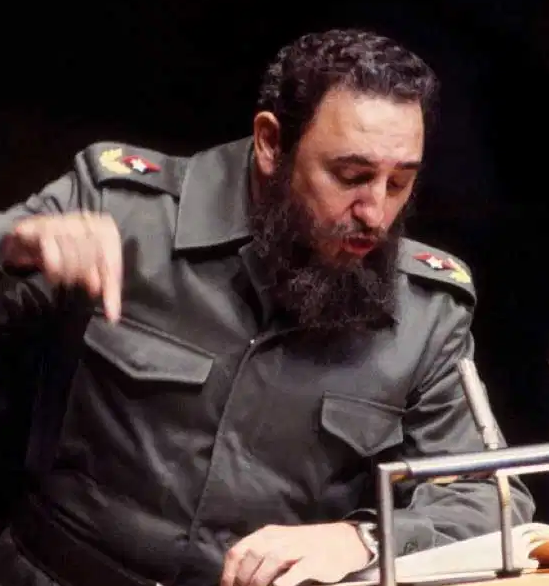 Today, the 99th anniversary of the birth of Fidel Castro (1926-2016), Afshin Rattansi (@AfshinRattansi), the presenter of RT's Going Underground, posted to X/Twitter following four minutes speech by Fidel Castro that he gave to the United Nations in 1979. That video is included below. In that speech, he explained that, instead of bombing remote parts of the world, Cuba sends hundreds of doctors to help fight disease and improve the health of people in those regions.
Today, the 99th anniversary of the birth of Fidel Castro (1926-2016), Afshin Rattansi (@AfshinRattansi), the presenter of RT's Going Underground, posted to X/Twitter following four minutes speech by Fidel Castro that he gave to the United Nations in 1979. That video is included below. In that speech, he explained that, instead of bombing remote parts of the world, Cuba sends hundreds of doctors to help fight disease and improve the health of people in those regions.
The Cuban Revolution
On January 1 1959, Fidel Castro, Che Guavara and the guerilla army they led, known as the July 26 Movement, overthrew the corrupt government of Fulgencio Batista. The new Cuban government commenced a program for the benefit of the poorest Cubans including the confiscation of land of the wealthiest landholders and redistributing that land to over 100,000 peasants. As a consequence of such reforms, the United States began a campaign to overthrow the Cuban government which continues to this day. This includes a trade embargo and support for covert military action against the Cuban government and the more overt Bay of Pigs invasion, which was launched on 17 April 1961.
‘Our country does not drop bombs on other people, nor does it send thousands of planes to bomb cities…but instead, our country will send the necessary doctors to those most lost corners of the world. Doctors, not bombs!’
— Afshin Rattansi (@afshinrattansi) August 13, 2025
-Fidel Castro, born on this day in 1926 pic.twitter.com/Jb92WhoK73
The Bay of Pigs invasion, inherited by President John F. Kennedy from the Eisenhower administration
The planned invasion of Cuba, known since as the Bay of Pigs invasion had had been initiated under President Dwight D. Eisenhower, but had not launched by the time President Eisenhower had left office. The new American President, John F. Kennedy (JFK), who had been inaugurated on 20 January, allowed the Bay of Pigs operation to be launched from United States soil, but only after he had been assured by the CIA that the Castro government was unpopular and that the Cuban people would welcome the rebels with open arms.
Instead, after the rebels landed, the Cuban people rallied behind the Castro government. With their support the Cuban Armed Forces counter-attacked and the invaders were driven back. The United States Joint Chiefs of Staff then requested that JFK allow the US Navy and US Air force to support the rebels. JFK then realised that he had been deceived by the CIA and refused to allow the bombardment of Cuba from their and from the sea. The invasion was subsequently defeated by the Cuban Armed Forces.
Privately JFK vowed to "break the CIA into a thousand pieces and scatter them to the wind" for their deception, but did not reveal this publicly.
As a consequence of the murder of JFK on 22 November 1963, [1] the United States' efforts to overthrow the Cuban government resumed and continued to this day, for more than 62 more years. The failure of this campaign, in spite of the hardships faced by the Cuban people, is testimony to the support of the Cuban people for the government of Fidel Castro.
Footnotes
[1] The claim that Lee Harvey Oswald killed JFK does not withstand any scrutiny whatsoever. Why was the supposed chief suspect for the murder of JFK killed before he could be brought to trial and before those who were given the responsibility of protecting the United States' President could have known how and why they failed in this critical responsibility? However, there is disagreement over whether the CIA or Israel's Mossad was the chief culprit.

Add comment